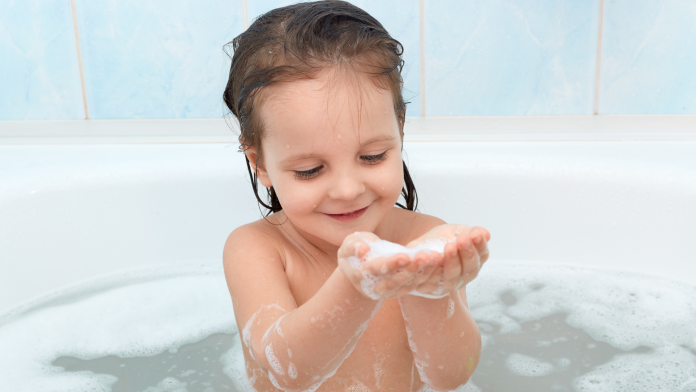As our little one grows, the more he will become active. This means, we can have more time to play with him, may it be at home or under the sun. Although the more he becomes active, it is also a must for us mommies to ensure that he’s clean and dry throughout his playtime. And while giving him a bath after playtime is a must, we should also remember to keep his skin healthy and moisturized.
But then, how do we mommies know that we are keeping our little one’s skin healthy and moisturized? Luckily, Dr. Dilip Tripathi, Johnson and Johnson’s Senior Manager, Essential Health R&D, gave us some insights and tips on this.
When is the best time to give babies a bath?
Dr. Tripathi: When giving babies a bath, it is important to choose a time when the parents or the caregiver is not too busy or with less chances of being interrupted. It is also a good idea to pick a time when the baby is alert and active or right after playtime. You need to clean up the sweat and dirt that are potentially clinging to the skin, which if left, can lead to irritations.
What should a baby’s bath routine include?
Dr. Tripathi: A baby’s bath should include a total rinse, before and after lathering. The rinsing or the cleansing should be done with a mild wash, such as the classic Johnson’s Milk+Rice Bath. And once done with the bath total rinse, his body should be dried with a soft towel to avoid any micro scratches, which can result from the friction of rubbing too hard. And lastly, the baby’s skin should be moisturized immediately after with a suitable lotion such Johnson’s Milk+Rice Lotion to restore the skin’s hydration.
When giving babies or kids’ a bath, is there a recommended water temperature? Should it be warm, lukewarm, or cold?
Dr. Tripathi: Water temperature should be lukewarm for babies because hot or warm water may burn their skin barrier. And if the skin barrier gets burned, it will not be good for them especially in humid weather. Cold water may cause babies to feel chilly on the onset and they might feel sick after the bath. So lukewarm water is the ideal water temperature.
In looking for a baby bath product, what should moms or parents check or look for?
Dr. Tripathi: Moms and parents should look for products that are mild and gentle in order to protect their children’s skin. They should look for ingredients that can provide nourishment to the baby’s skin, such as milk or milk protein. Looking for products with the right ingredients can be tricky as some protective ingredients can still be harsh on a growing toddler’s skin. So the product (and its ingredients) definitely needs to be natural that suits the current skin conditions. An example of this is a product that contains rice extracts in its ingredients would be great as it provides nourishment for the skin.
What should parents know about their kids’ skin? How is it different from adults in terms of sensitivity?
Dr. Tripathi: A baby’s skin is relatively thinner compared to an adult and it is still developing. It is also more sensitive and prone to damage. Hence, more nourishment and care is needed.
What skin red flags should moms watch out for in their babies?
Dr. Tripathi: Firstly, moms should regularly check their baby’s skin. It should be visibly clear from any dirt. Moms should also be on the lookout for any dry patches, which can be avoided by slathering lotion. Apart from this, moms should also watch out for any visible redness, scratches, or rashes – as these can be indications that the skin barrier is breached or damaged. Therefore, this means that the baby needs more skin reinforcement or nourishment to protect his skin barrier.
What tips can you give to parents to effectively teach kids to bathe properly on their own?
Dr. Tripathi: Parents should treat bath time and teaching it as a fun time, and should:
- Effectively explain the importance of taking a bath regularly in a simple way that kids can easily understand.
- Ensure that bath time is a positive experience for the kids, and not rush them to take a bath.
- Assure their kids that taking a bath is not something to be afraid of, and that it’s an easy thing to do on their own.
- Maximize the advantages that bathing time offers for the cognitive development of the child.
Finally, any general tips on how parents can take care of their kids’ skin?
Dr. Tripathi: In taking care of a kids’ skin, parents should remember these main points:
- Kids should be properly hydrated.
- Kids need to eat nutritious food so that their skin also gets the nourishment they need.
- If possible, keep kids’ surroundings clean and free from obstructions so that scratches are minimized when playing.
- Avoid going out between 11 AM and 1 PM as this is the time when the sun’s UV rays are very strong. If unavoidable, ensure that kids’ skin is protected by staying under the shade, using an umbrella, or wearing sunblock protection. Also seek your pediatrician on the right sunblock to use.
- Regular use of lotion will help maintain the skin’s hydration levels and protect it from external damage.
- And finally, opt for products that are expertly-made for kids and trusted by generations of parents, such as Johnson’s Milk+Rice.





